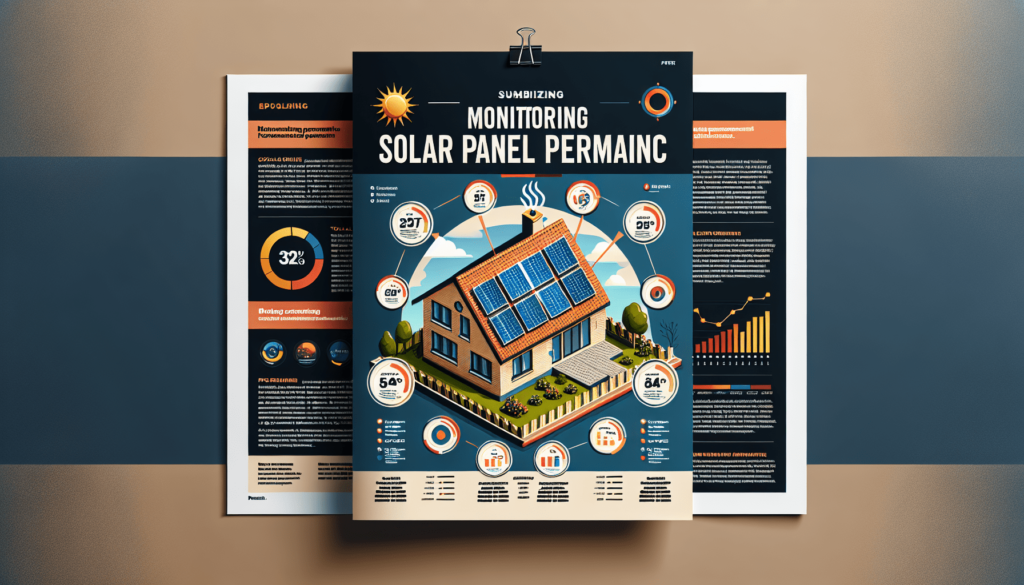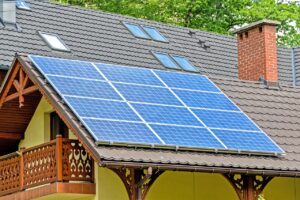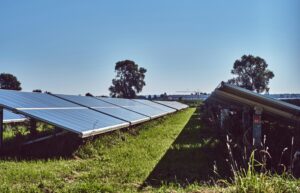Curious about how to keep a close eye on your solar panels? Look no further! In this article, we will guide you through the ins and outs of monitoring the performance of your solar panels. Don’t worry, it’s easier than you think! With our helpful tips and tricks, you’ll be able to assess the efficiency of your panels and ensure they are working at their optimal capacity. Say goodbye to any uncertainties and hello to a smoothly operating solar system. Let’s get started!

Install a Solar Monitoring System
Installing a solar monitoring system is essential for effectively monitoring the performance of your solar panels. By choosing a reputable monitoring system, following the installation instructions, and connecting the system to your solar panels, you can easily track and analyze the power generation of your solar energy system.
Choose a reputable monitoring system
When selecting a solar monitoring system, it is important to choose a reputable brand or provider. Look for systems that have positive customer reviews, a proven track record, and reliable customer support. Opting for a well-known and established brand will ensure that you have access to accurate and up-to-date data regarding your solar panel’s performance.
Follow the installation instructions
Proper installation is crucial for the efficient functioning of a solar monitoring system. Before initiating the installation process, carefully read and follow the manufacturer’s instructions. Each monitoring system may have specific requirements, so it’s important to understand the installation process thoroughly. If needed, seek professional assistance to ensure the system is installed correctly and to avoid any potential damage to your solar panels.
Connect the system to your solar panels
After installation, connect the monitoring system to your solar panels. This connection allows the monitoring system to gather data on the energy generated by your solar panels. Make sure to connect the system correctly and securely to ensure accurate data collection. Once connected, you’ll be able to access real-time information regarding the performance of your solar panels.
Check the Generated Power
Monitoring the power generated by your solar panels is essential for assessing their performance and ensuring optimal efficiency. By regularly checking the daily and monthly power production and comparing it to the expected values, you can identify any issues or deviations that may require attention.
Monitor the daily power production
Keep an eye on the daily power production of your solar panels. A solar monitoring system will provide you with real-time data on the energy generated each day. By tracking these daily values, you can ensure that your solar panels are working at their expected capacity and identify any sudden drops or spikes in power output.
Track the monthly power production
In addition to daily monitoring, it is important to track the monthly power production of your solar panels. This will provide a broader picture of the performance of your system over time. By comparing the monthly energy generation to previous months or the same month in previous years, you can identify any long-term trends or variations in performance.
Compare the power production to the expected values
To accurately assess the performance of your solar panels, it is essential to compare the power production to the expected values. This can be determined by considering factors such as the size and capacity of your system, the amount of sunlight available in your area, and the expected efficiency of your solar panels. Any significant deviations from the expected values may indicate issues that require further investigation or maintenance.

Monitor the Efficiency
Monitoring the efficiency of your solar panels allows you to identify any drops in performance and take appropriate action to address them. By calculating the performance ratio, comparing the efficiency to the manufacturer’s specifications, and identifying any significant drops in efficiency, you can ensure that your solar panels are operating optimally.
Calculate the performance ratio
The performance ratio is a metric that measures the efficiency of your solar panels by comparing the actual energy generated to the theoretical energy generation based on available sunlight. By calculating this ratio, you can determine how effectively your solar panels are converting sunlight into electricity. Lower performance ratios may indicate issues such as dirt or debris on the panels, shading, or malfunctioning components.
Compare the efficiency to the manufacturer’s specifications
Manufacturers of solar panels typically provide efficiency specifications for their products. These specifications indicate the expected energy generation based on the size and capacity of the panels. By comparing the actual efficiency of your solar panels to these specifications, you can assess whether your panels are performing as expected or if there are any deviations that may require attention or maintenance.
Identify any significant drops in efficiency
Regularly monitoring the efficiency of your solar panels is crucial for identifying any significant drops in performance. A sudden decrease in efficiency may indicate issues such as damaged panels, malfunctioning components, or shading. By promptly addressing these issues, you can ensure that your solar panels continue to operate at their maximum capacity.
Analyze the Weather Conditions
The weather has a significant impact on the performance of solar panels. By considering the impact of weather on solar panel performance, monitoring the effect of temperature on efficiency, and evaluating shading and its effect on output, you can better understand and optimize the performance of your solar energy system.
Consider the impact of weather on solar panel performance
Weather conditions such as cloud cover, rain, and snow can affect the amount of sunlight reaching your solar panels. It is important to consider these factors when assessing the performance of your system. For example, during cloudy or rainy days, the energy generation may be lower than expected. By monitoring weather conditions and understanding their impact on solar panel performance, you can make accurate evaluations of your system’s efficiency.
Monitor the effect of temperature on efficiency
Extreme temperatures, both hot and cold, can affect the efficiency of solar panels. High temperatures can cause a decrease in efficiency due to increased resistance and thermal losses, while extremely low temperatures can impact performance by reducing the conductivity of the panel materials. By monitoring the effect of temperature on efficiency, you can identify any temperature-related issues and implement appropriate measures to mitigate their impact.
Evaluate shading and its effect on output
Shading, whether from nearby buildings, trees, or other objects, can significantly reduce the output of your solar panels. It is important to evaluate the level of shading your panels are experiencing and take appropriate action to minimize its impact. This may involve several strategies, such as trimming foliage, adjusting the tilt or orientation of your panels, or considering shading analysis tools to optimize the positioning of your solar panels.

Inspect the Inverter
The inverter is a crucial component of a solar energy system, as it converts the direct current (DC) generated by the solar panels into usable alternating current (AC) electricity. By regularly checking the inverter’s status lights, reviewing its performance data, and contacting a professional if there are any issues, you can ensure the proper functioning of your inverter and, consequently, your solar panel system.
Check the inverter’s status lights
Inverter manufacturers often include status lights that provide valuable information about the inverter’s operation. By regularly checking these lights, you can quickly identify any potential issues. If the lights indicate any errors or malfunctions, it is advisable to consult the manufacturer’s documentation or contact a professional for further assistance.
Review the inverter’s performance data
Many inverters come equipped with monitoring capabilities, providing real-time data on their performance. By reviewing this data regularly, you can ensure that the inverter is functioning optimally. Keep an eye out for any unusual patterns, such as fluctuating output or erratic behavior, as they may indicate potential problems.
Contact a professional if there are any issues
If you encounter any issues with your inverter that you are unable to resolve on your own, it is important to reach out to a professional solar installer or technician. They have the expertise and knowledge to diagnose and troubleshoot any complex issues, ensuring the efficient operation of your solar panel system.
Keep an Eye on Battery Levels
If you have solar battery storage as part of your solar energy system, monitoring the charge level of the batteries is crucial. By ensuring that the batteries are being charged properly and detecting any abnormal battery behavior, you can optimize their performance and extend their lifespan.
Monitor the charge level of solar battery storage
Solar battery systems store excess energy generated by your solar panels for later use. By regularly monitoring the charge level of your batteries, you can ensure that they are receiving and storing the appropriate amount of energy. Low charge levels may indicate issues such as a malfunctioning charge controller or excessive energy consumption.
Ensure the battery is being charged properly
Monitoring the charging process of your solar batteries is essential to avoid overcharging or undercharging. Overcharging can lead to battery damage, while undercharging may limit their capacity and performance. By verifying that your batteries are being charged properly, you can optimize their efficiency and longevity.
Detect any abnormal battery behavior
Abnormal battery behavior, such as rapid discharge, fluctuating charge levels, or inconsistent performance, may indicate underlying issues that require attention. Regular monitoring allows you to detect such anomalies early on and take appropriate action, whether it involves inspecting connections, replacing faulty components, or seeking professional assistance.

Look for Any Power Fluctuations
Power fluctuations, sudden drops, or spikes in power output can indicate potential issues with your solar panel system. By monitoring for such fluctuations, investigating their cause, and taking appropriate action to address the issue, you can ensure the stable and reliable operation of your system.
Monitor for sudden drops or spikes in power output
Keep a close eye on your solar panel system’s power output. Sudden drops or spikes in energy generation may point to problems such as damaged panels, wiring issues, or component failures. By regularly monitoring for such fluctuations, you can promptly address any underlying issues and minimize any potential performance losses.
Investigate the cause of any fluctuations
When you encounter power fluctuations, it is important to investigate the cause thoroughly. Examine your solar panels, wiring, inverters, and other components for signs of damage or malfunction. Additionally, consider external factors that may contribute to the fluctuations, such as changes in weather conditions or shading. Identifying the root cause will help you take appropriate action and prevent any further impact on your system’s performance.
Take appropriate action to address the issue
Once you have identified the cause of the power fluctuations, take the necessary steps to rectify the issue. This may involve repairing or replacing damaged components, adjusting the system configuration, or seeking professional assistance. Promptly addressing and resolving the issue will restore your system’s stability, ensuring optimal power generation.
Regularly Clean and Maintain the Panels
Regular cleaning and maintenance of your solar panels are crucial for their optimal performance and longevity. By inspecting panels for dirt, debris, or damage, cleaning them as recommended by the manufacturer, and scheduling professional maintenance if necessary, you can ensure that your solar panels operate efficiently and continue to generate clean energy.
Inspect panels for dirt, debris, or damage
Periodically inspect your solar panels to identify any accumulation of dirt, debris, or damage. Dust, leaves, bird droppings, and other forms of debris can build upon the panels, reducing their efficiency. Additionally, inspect for any signs of physical damage, such as cracks or scratches. Cleaning and addressing such issues promptly will help maintain the performance and lifespan of your system.
Clean panels as recommended by the manufacturer
Cleaning your solar panels regularly is essential for optimal performance. Follow the manufacturer’s recommended cleaning procedures, which may involve using non-abrasive cleaning tools, mild detergents, and gentle rinsing. Avoid using harsh chemicals or abrasive materials that may damage the surface of the panels. By keeping your panels clean, you can maximize their energy absorption and ensure efficient power generation.
Schedule professional maintenance if necessary
In addition to regular cleaning, it may be beneficial to schedule professional maintenance for your solar panel system. Professionals can conduct thorough inspections, identify any potential issues, and perform necessary repairs or adjustments. Consider scheduling maintenance annually or semi-annually to ensure that your system operates at its best.

Review Historical Data
Analyzing long-term power production trends and reviewing historical data is an effective way to optimize the performance of your solar panel system. By identifying patterns or deviations from normal performance and using the data to make informed decisions, you can maximize energy generation and improve overall efficiency.
Analyze long-term power production trends
By reviewing historical data, you can identify long-term trends in your power production. Look for seasonal variations, changes in energy generation patterns, or any consistently low or high periods. Such analysis can provide insights into the overall performance of your system and help you make informed decisions about optimizing its efficiency.
Identify any patterns or deviations from normal performance
Analyzing historical data allows you to identify any patterns or deviations from normal performance. Significant variations in power generation may indicate underlying issues, such as faulty components, shading problems, or changes in surrounding conditions. Identifying these patterns or deviations will enable you to address the root causes and make the necessary adjustments to enhance your system’s performance.
Use the data to optimize your solar panel system
The data gathered from historical analysis can be instrumental in optimizing your solar panel system. Utilize the insights gained to make informed decisions regarding system maintenance, component upgrades, or adjustments to maximize efficiency. By leveraging this data, you can continuously improve the performance of your solar panel system and ensure long-term energy sustainability.
Stay Informed and Seek Professional Help
Staying informed about solar panel technology and industry trends is crucial for maximizing the performance of your solar panel system. Additionally, seeking professional help when encountering complex issues ensures that your system receives the necessary expertise and attention.
Stay updated on solar panel technology and industry trends
The field of solar panel technology is constantly evolving, with advancements and innovations regularly emerging. Stay informed about the latest technological developments and industry trends by following reputable sources, attending conferences or webinars, or engaging with industry experts. This knowledge will enable you to make informed decisions and take advantage of new opportunities to optimize your solar panel system.
Consult with a professional solar installer or technician
When facing complex issues or uncertainties regarding your solar panel system, it is advisable to seek professional help. Consult with a qualified solar installer or technician who can provide expert advice and assistance. They can evaluate your system, diagnose any problems, and recommend appropriate solutions or optimizations. Professional guidance ensures that you address any system-related issues effectively and maintain the optimal performance of your solar panels.
Seek help whenever you encounter complex issues
Do not hesitate to seek professional help whenever you encounter complex issues with your solar panel system. Whether it’s troubleshooting an unusual fault, optimizing system performance, or upgrading components, professional assistance can save time, prevent further damage, and ensure continued efficient operation. Recognize your limitations and rely on professionals to provide the expertise required for resolving complex solar panel system issues.
Conclusion
Efficiently monitoring the performance of your solar panels is essential for maximizing energy generation and ensuring the long-term reliability of your solar energy system. By installing a reputable solar monitoring system, regularly checking the generated power, monitoring the efficiency, analyzing weather conditions, inspecting the inverter, keeping an eye on battery levels, monitoring for power fluctuations, cleaning and maintaining the panels, reviewing historical data, and staying informed while seeking professional help, you can maintain optimal performance, extend the lifespan of your system, and contribute to a more sustainable future. So take the necessary steps to actively monitor and address any issues, and enjoy the benefits of clean and renewable solar energy for years to come.




